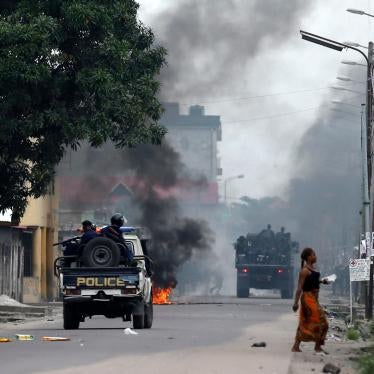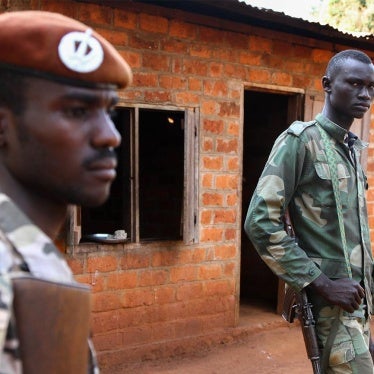The Honorable Blaise Compaore
President of the Republic of Burkina Faso
Dear President Compaore:
I am writing on behalf of the Arms Division of Human Rights Watch, an independent human rights monitoring group, to ask you urgently to investigate Burkina Faso's possible role in violations of international arms embargoes imposed on human rights abusers.
As you know, a recent United Nations report named Burkina Faso in connection with violations of sanctions imposed on UNITA rebels in Angola who have been responsible for gross human rights abuses and systematic violations of international humanitarian law. The "Report of the Panel of Experts on Violations of Security Council Sanctions Against UNITA," released on March 15, concluded in part that "it is highly likely that arms legally sold and transported to Burkina Faso have been diverted by Burkinabe authorities to UNITA in breach of Security Council sanctions."
In addition, independent Human Rights Watch investigations into weapons flows to abusive rebel forces in Sierra Leone and Angola have raised very serious questions about the witting or unwitting role of Burkina Faso as a country of transshipment for internationally proscribed weapons flows. The evidence suggests that large shipments of weapons Burkina Faso declared it was purchasing for its own use may in fact have been illegally diverted to other end-users, and that Burkinabe government resources, including the VIP wing of the Ougadougou airport and a government-registered plane, may have been used to facilitate such diversions. The reports to this effect are detailed below.
Reports of Illegal Arms Shipments via Burkina Faso
In April 1999 the commander of ECOMOG in Sierra Leone, Maj.-Gen. Felix Mujakperuo, accused Burkina Faso of facilitating an illegal arms shipment to Revolutionary United Front (RUF) rebels in Sierra Leone in violation of a United Nations embargo. Speaking at a press conference in Freetown, he claimed that on March 14, 1999, a Ukrainian-registered cargo plane had delivered sixty-eight tons of weapons and ammunition to Ouagadougou. There, he alleged, the plane parked in the airport's VIP terminal and the weapons were transferred onto a plane destined for Liberia, which is also subject to a U.N. arms embargo, and then shipped onward to the RUF inside Sierra Leone. Mujakperou also reported the incident to the United Nations.
The Ukrainian government responded to these allegations in a June 1, 1999, letter to the U.N. committee responsible for monitoring the embargo on the RUF, to which it appended relevant documents. Ukraine maintained that it had sold the weapons to the government of Burkina Faso. The documents provided, of which Human Rights Watch has obtained copies, show that the government of Burkina Faso issued an end-user certificate to the Ukrainian state-owned company Ukrspetsexport for the purchase of weapons and ammunition in a deal arranged by the Gibraltar-based Chartered Engineering and Technical Company, Ltd. The end-user certificate explicitly states that the ministry of defense of Burkina Faso, "the final consumer" of the goods listed, was committing itself to refrain from re-exporting the equipment without the agreement of the government of Ukraine. The Gibraltar-based company then contracted a trade agent of the Ukrainian air carrier Antonov Design Bureau, the British company Air Foyle, to fly the goods to Burkina Faso. According to the documents, flight ADB1737, an Antonov-124 (registration UR-82008), carried 67,564 kilograms of "defense equipment and ammunition" from Kiev to Ouagadougou on March 13, 1999. The end-user certificate indicates that the deal involved 3,000 AKM (Kalashnikov) assault rifles, fifty machine guns, twenty-five rocket-propelled grenade launchers (RPGs), five Strela-3 (also known as SA-7) missiles, and five Metis anti-tank guided missile systems, as well as ammunition for these weapons.
It is important to note that, according to an authoritative source on national arms inventories-Jane's Infantry Weapons-Burkina Faso has been using NATO-standard weaponry for its armed forces and has no known armaments deriving from the former Warsaw Pact. As a consequence, we believe it unlikely that Burkina Faso would have ordered and purchased for its own defense needs the quantities of weapons from the former Soviet Union provided in the shipment described.
In another case, Burkina Faso also was named as a transshipment country for weapons that were delivered to Sierra Leone. In an October 1999 article published in the Washington Post, author James Rupert reported that ECOMOG said five aircraft, including one whose registration matched that of a Boeing 727 owned by the Burkinabe government, had carried weapons to the RUF via Liberia. Quoting ECOMOG, Rupert told Human Rights Watch that the flights from Ouagadougou to Robertsfield International Airport in Liberia took place in February and September 1998, and that the Burkinabe Boeing 727-14, registration number XT-BBE, "was seen offloading arms on 26 and 29 February 1998, each time after flying Rabat [Morocco]-Ouagadougou-Robertsfield."
Interviews conducted by Human Rights Watch in Burkina Faso in June 1998 further suggest that flights to parties under international embargo regularly transited through Ouagadougou airport. Pilots and staff indicated that flights carrying arms or fuel regularly arrived from central Africa to refuel in Ouagadougou on their way to other destinations. An official at the airport said, "It can be one of any number of locations: Kinshasa, Brazzaville, UNITA. We don't ask questions."
In light of these serious allegations, we urge you to immediately appoint an independent commission to carry out a full inquiry. We further request that you make public the methodology of the inquiry and its findings at the earliest possible date.
We look forward to your response.
Sincerely,
Joost R. Hiltermann
Executive Director
Arms Division






